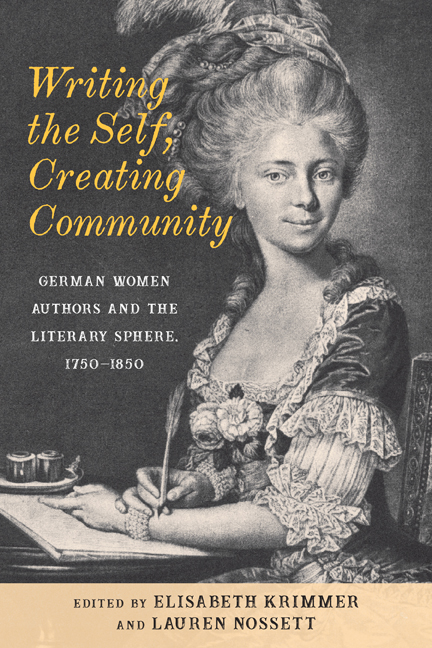Book contents
- Frontmatter
- Contents
- Acknowledgments
- Introduction
- Part I Writing a Community
- 1 Empowering Germany’s Daughters: On the Pedagogical Program and the Poetic Techniques of Sophie von La Roche
- 2 “Ich spreche lieber von guten Büchern”: Sophie von La Roche’s Concept of Female Authorship and Readership
- 3 Challenging Female Ideals: Marie-Elisabeth de La Fite’s Translation of Sophie von La Roche’s Geschichte des Fräuleins von Sternheim
- 4 Catherine II, Polyxene Büsching, and Johanna Charlotte Unzer: A Literary “Community of Practice”
- Part II Writing the Self
- 5 Ghostwriters: The Apparitional Author in Benedikte Naubert’s “Die Weiße Frau” (1792) and Sophie Albrecht’s Das Höfliche Gespenst (1797)
- 6 Vampirism Inverted: Pathology, Gender, and Authorship in Karoline von Günderrode’s “Die Bande der Liebe”
- 7 Wozu eine Amazonen—Literatur? Literary Creativity and Productivity in the Writings of Helmina von Chézy
- 8 Women Writers and the Märchenoma: Foremother, Identity, and Legacy
- Part III Writing toward Emancipation
- 9 The Illegitimacy of Authorship and the Legitimization of Passion in Agnes von Lilien
- 10 The Politics of the Female Body in Louise Aston’s and Fanny Lewald’s Writings through the Prism of the Romantic Theory of Sociability and Dialogue
- 11 Weibliche Irrsterne: Louise Otto and the Notion of Female Genius in Nineteenth-Century Germany
- Bibliography
- Notes on the Contributors
- Index
10 - The Politics of the Female Body in Louise Aston’s and Fanny Lewald’s Writings through the Prism of the Romantic Theory of Sociability and Dialogue
Published online by Cambridge University Press: 01 October 2020
- Frontmatter
- Contents
- Acknowledgments
- Introduction
- Part I Writing a Community
- 1 Empowering Germany’s Daughters: On the Pedagogical Program and the Poetic Techniques of Sophie von La Roche
- 2 “Ich spreche lieber von guten Büchern”: Sophie von La Roche’s Concept of Female Authorship and Readership
- 3 Challenging Female Ideals: Marie-Elisabeth de La Fite’s Translation of Sophie von La Roche’s Geschichte des Fräuleins von Sternheim
- 4 Catherine II, Polyxene Büsching, and Johanna Charlotte Unzer: A Literary “Community of Practice”
- Part II Writing the Self
- 5 Ghostwriters: The Apparitional Author in Benedikte Naubert’s “Die Weiße Frau” (1792) and Sophie Albrecht’s Das Höfliche Gespenst (1797)
- 6 Vampirism Inverted: Pathology, Gender, and Authorship in Karoline von Günderrode’s “Die Bande der Liebe”
- 7 Wozu eine Amazonen—Literatur? Literary Creativity and Productivity in the Writings of Helmina von Chézy
- 8 Women Writers and the Märchenoma: Foremother, Identity, and Legacy
- Part III Writing toward Emancipation
- 9 The Illegitimacy of Authorship and the Legitimization of Passion in Agnes von Lilien
- 10 The Politics of the Female Body in Louise Aston’s and Fanny Lewald’s Writings through the Prism of the Romantic Theory of Sociability and Dialogue
- 11 Weibliche Irrsterne: Louise Otto and the Notion of Female Genius in Nineteenth-Century Germany
- Bibliography
- Notes on the Contributors
- Index
Summary
IN Für und wider die Frauen: Vierzehn Briefe (1870; For and Against Women: Fourteen Letters), the author and early advocate of women's education Fanny Lewald (1811–89) writes, “Ich möchte umgekehrt fragen: Was hat Euch eine Frau, die kein eigenes Geistesleben führt, die nichts Rechtes weiß und nichts Rechtes kann, was hat sie Euch hinzugeben als eben ihren Körper? Und begehrt Ihr von der Ehe nichts als Befriedigung Eures sinnlichen Verlangens?” (I would like to ask in return: What does a woman have to offer you apart from her body when she does not lead an independent intellectual life, does not know anything, and cannot do anything? And do you desire nothing more from marriage than sensual gratification?). This sentence illustrates how Fanny Lewald employs dialogical discourse to convey her ideas about genderrole expectations within the institution of marriage. She subverts a traditional male discourse while drawing on a history of women's writing in order to make radical claims about female intellectual autonomy in marriage. While many women writers of the Vormärz period participated actively in women's rights movements and debates, Lewald and the author and feminist activist Louise Aston (1814–71) were much more forward-thinking than their contemporaries. They valued their freedom and control over their bodies precisely because nineteenth-century society policed and sanctioned any form of transgression related to the female body and female sexuality. Aston experienced the effects of this prejudice firsthand: the political and religious convictions outlined in her pamphlet Meine Emancipation, Verweisung und Rechtfertigung (1846; My Emancipation: Expulsion and Justification) provided grounds for an official interrogation while anonymous accusations of an immoral lifestyle sufficed to expel her from Berlin.
In the following, I will show that Lewald's and Aston's defiance of oppressive patriarchal structures manifests itself in the aesthetic subversion of established genres. More importantly, in their attempts to resist and redefine traditional gender expectations, Lewald and Aston drew great inspiration from those who came before them. Both studied the works and styles of female Romantic writers, particularly Rahel Levin Varnhagen and Bettina Brentano von Arnim. Much like their predecessors, they created a “female life in letters.” Informed by a tradition of women's writing, Louise Aston and Fanny Lewald relied on the art of the dialogue and the Romantic theory of sociability and symphilosophy to carve out niches of female autonomy and creativity.
- Type
- Chapter
- Information
- Writing the Self, Creating CommunityGerman Women Authors and the Literary Sphere, 1750–1850, pp. 225 - 247Publisher: Boydell & BrewerPrint publication year: 2020



